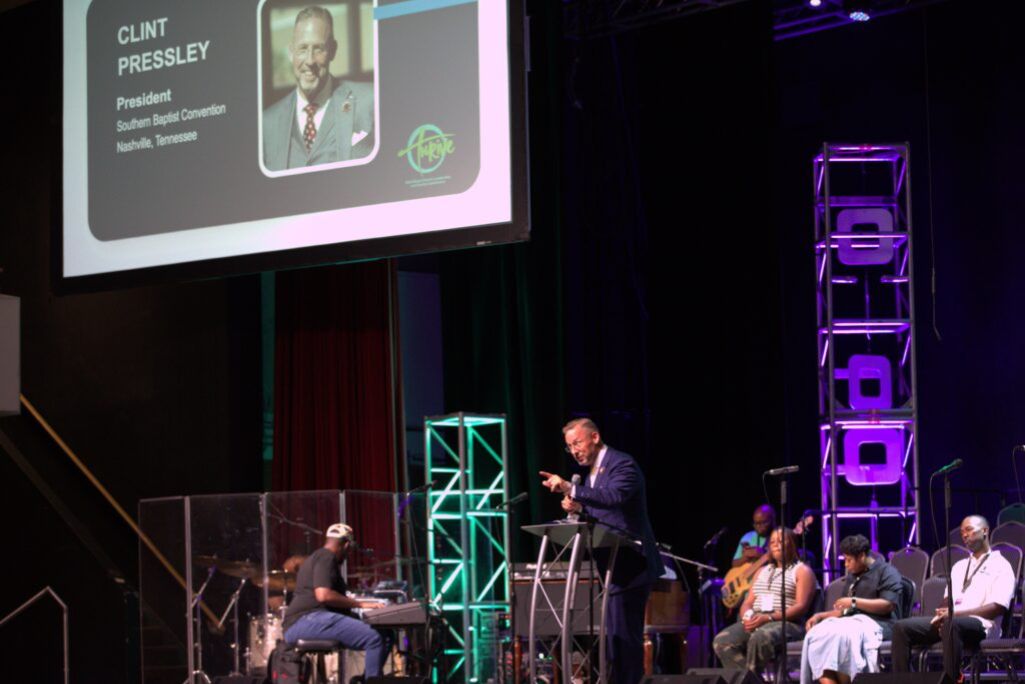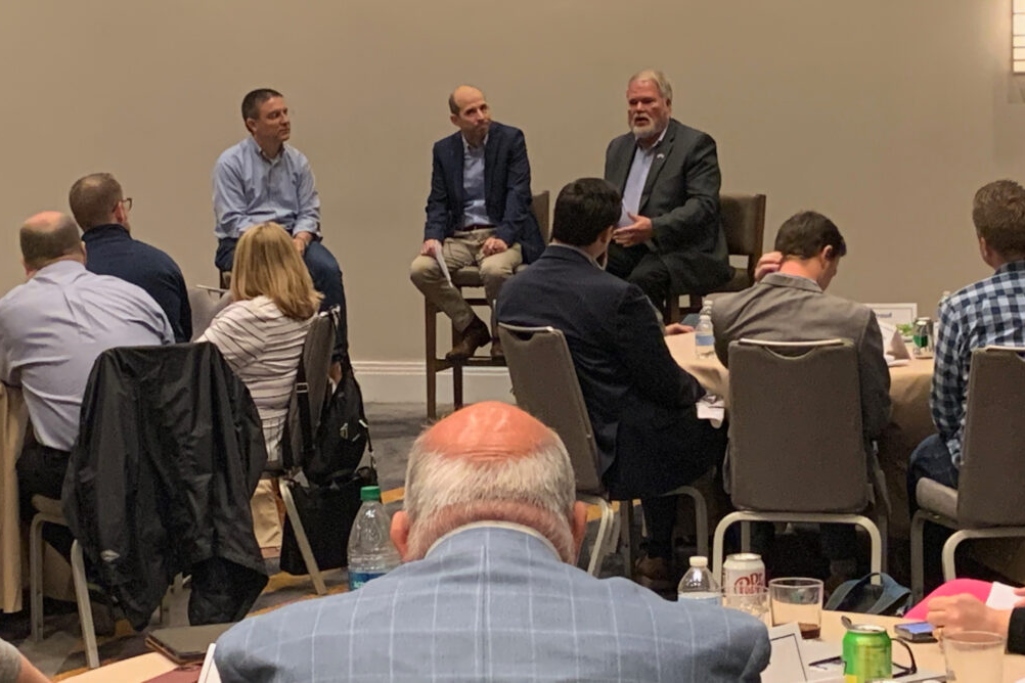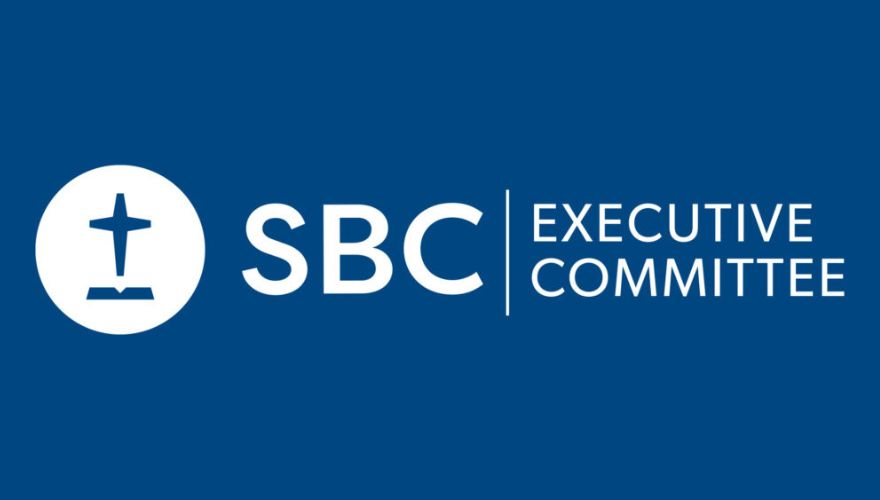
SBC President Clint Pressley addresses the crowd of the Black Church Leadership and Family Conference on July 21 at Ridgecrest Conference Center in North Carolina.
RIDGECREST, N.C. (BP) — Southern Baptist Convention (SBC) President Clint Pressley saw himself as the “white boy in the room” when he worshipped on opening night at the Black Church Leadership and Family Conference on July 21, the guest of African American pastor Gregory Perkins.
But Pressley said he felt so comfortable and in the presence of the Lord that he wanted to create that same feeling of belonging for members of other ethnic and cultural groups when they attend his pastorate, Hickory Grove Baptist Church in Charlotte.
“Standing in there today, worshipping with you, I’m obviously a white boy in a room with everybody that’s Black. But I didn’t feel alien,” he said. “I didn’t feel like I don’t belong here. I didn’t even feel like I was an outsider looking in.
“I felt like I’m in here. I’m here and it feels right. You were able to cultivate that and give that to me. How do I do that for men and women that come in (Hickory Grove) that are Black?”
Pressley shared his feelings as one of several panelists in a Late Night Conversation following worship Perkins hosted as president of the National African American Fellowship (NAAF) of the SBC, representing about 4,000 churches.
Focusing on challenges Black pastors face in Southern Baptist life, panelist and NAAF National Vice President Jerome Coleman lamented that Black is not appreciated as a unique culture impacting the faith experience, but is seen instead as simply a color to be assimilated into Southern Baptist life.
“And I think when we think of Black, there are those in the convention who just see color. They don’t understand that Black is a culture. And Black is a faith. And Black is a people,” Coleman said. “We have our own uniqueness that God has created us to contribute to the whole. And it feels like we are being assimilated.
“Y’all at the worship service tonight?” Coleman asked. “No one does it quite like we do.”
Regardless of the ethnic composition of a congregation and its leadership team, Coleman said, each church adheres to a distinct cultural flavor and is seen as such.
Pressley’s pastorate is majority white with other ethnicities, according to the SBC’s Annual Church Profile. But the community in which the church sits is very diverse, Pressley said, with the church operating a Christian school that is 60% Black.
Pressley accepted Perkins’ invitation to listen to NAAF’s concerns and help as he could, he told Baptist Press, expressing appreciation for the collegial nature of the conversation he saw as “genuinely brothers and sisters discussing how to profess and live out the gospel.”
But Pressley also sought insight into ministry with nonwhite members of his community, expressing a desire to avoid taking on a church culture specific to any ethnicity. For example, Pressley said he has avoided cross-cultural pulpit swaps because he doesn’t want Hickory Grove to be seen as a white church, an ideal he admits might be elusive.
“Everything I’ve heard today has been gospel-centered,” he told panelists. “How do I hold the gospel as the foremost and still respect, rightly respect, culture where it’s necessary? …What do I tell African Americans in my church? Should I send them here… to fellowship? Do they need to come here?”
Joining Pressley and Coleman on the panel were Todd Unzicker, executive director and treasurer of the Baptist State Convention of North Carolina; moderator Jawane Hilton, NAAF director of advocacy; Joy Pigg, children’s minister at Zion Baptist Church in Marietta, Ga.; and Justin Lester, pastor of Friendship Baptist Church, a non-Southern Baptist congregation in Vallejo, Calif.
Unzicker championed the nondenominational aspects of Southern Baptist life found in the autonomy of the local church. He pursues relationships with Black Southern Baptists, he said, because they are vital to Southern Baptist life.
“I think discipleship happens in relationship. And what I say is that I don’t need my African American brothers because it’s cool or because of any kind of cultural political leanings. I need you because of Revelation 5,” Unzicker said. “When someone from every tribe, nation, tongue is around the throne, saying worthy is the Lamb that was slain. If Jesus prayed, ‘Thy kingdom come on earth as it is in heaven,’ then I ask the question, ‘Why not in North Carolina, as it is in heaven?’ What I say is let’s begin having more dialogues.”
Coleman perceives within Southern Baptist realms a move to refashion Black churches as multicultural congregations, unlike Hispanic and Asian congregations that are embraced as they are.
“And so this whole idea of multicultural and trying to impose it upon the African American church to me is saying that our culture is not valued enough, that our theology is not as good, our doctrine is not sound and our practice is not biblical,” Coleman said. “When the reality is, we have a certain slant on things because of the uniqueness we’ve experienced within this country.”
Incorporating and empowering younger generations and singles within the church body, church growth, healing from past trauma, entrepreneurship, seeing the church beyond four walls and teaching fiscal responsibility among congregants were also discussed.
“We need to just be incredibly aware of how Gen Z, Gen Alpha, Gen Beta are looking at us as the church. There is an inherent distrust already,” Pigg said. “They don’t like this thing that we’ve built. And so they’re not, I guess the young kids might say clock that tea. Yeah … there are things that they’re not going for.”
Pigg encouraged leaders to listen sincerely to the concerns of younger generations and respond wholeheartedly with action promoted and embraced by the senior pastor.
“There are conversations that we’ve had over and over again where we come away not with a new, changed behavior but the same old, same old,” she said of churches. “And so (younger generations) are opting not to play these games.”
(EDITOR’S NOTE — Diana Chandler is Baptist Press’ senior writer.)


